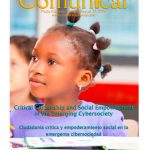The present paper analyzes the mediation role of the parents in their children’s education. It shows a predictive model that includes parental education style and their trust in the interactive media for their children’s acquisition of critical cognitive abilities. It also identifies the personal and contextual factors that are related to the parental education style.
The model was tested on a representative sample of 765 families from the Madrid Community selected on the educational level, center type, and district income bases.
It was found that children’s educational level is the factor of greatest impact on the acquisition of critical abilities. Nevertheless, as parents adopt a less restrictive style regarding the uses of Internet, there is a more positive influence on the acquisition of critical abilities independently of the age effect. The results question the role of parental restrictions on the use of the interactive media to encourage the education of critical citizens.
Authors:
- Dr. MarĂa Sánchez-Valle, Brechaymayores Research group, PROVULDIG programme. CEU San Pablo University (Spain)
- Dr. Belinda de-Frutos-Torres,University of Valladolid (Spain)
- Dr. Tamara Vázquez-Barrio. CEICIN Research group. PROVULDIG Programme. CEU San Pablo University (Spain)


